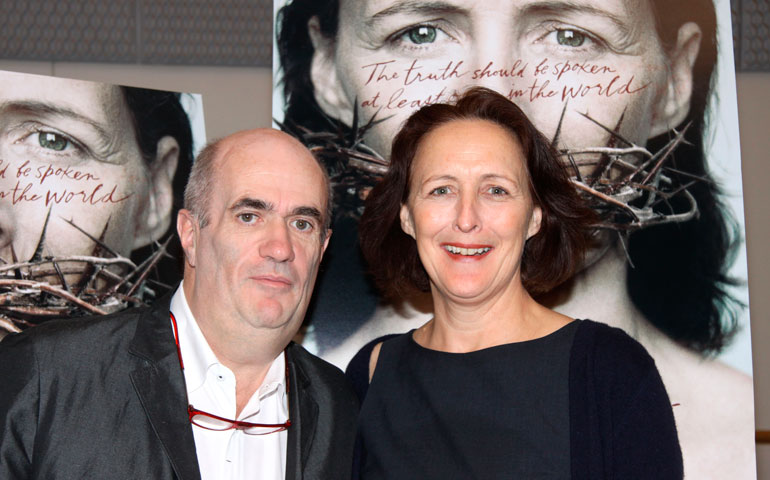
Colm Tóibín, left, author of The Testament of Mary, and actress Fiona Shaw appear at a March 14 press event in New York. Shaw stars in the one-woman adaptation of the novella that is scheduled to open on Broadway in April. (WENN.com/Joseph Marzullo)

THE TESTAMENT OF MARY
By Colm Tóibín
Published by Scribner, $19
Editor's note: NCR rarely reviews fiction, though this year there may be three exceptions. This monologue, published as a novella, is one. "Mary" is a genre more given to devotionals. As mother of Jesus, she rarely generates the broader discussion that this offering has provoked.
Through his extraordinary narrative powers, the Irish novelist Colm Tóibín has created a riveting portrayal of an aged Mary, who after some 20 years of silence is determined to tell the truth about the dramatic events of her life. From the opening paragraphs of The Testament of Mary the reader has a sense of foreboding.
This Mary is not the iconic mother of God, but a tightly coiled woman whose haunting monologue lingers in one's imagination. Neither easily dismissed nor forgotten, this Mary must be reckoned with. Because Testament takes many liberties with the inherited Gospel accounts, literalists have been quick to condemn it as a vile, despicable betrayal of the Christian story, an anti-Catholic diatribe.
That is clearly to miss the point.
The structure of this 81-page novella is that of Mary remembering the life and death of one she calls not Jesus, but her "son." The setting is Ephesus, where, after the crucifixion, she has lived in isolation -- kept, guarded and provided for by her son's followers, for whom she has contempt. Now these fools have revisited her, attempting to extract her account of the events she holds in memory. Suspicious of their intent, Mary insists that she "will not say anything that is not true." Her testament is not only her true story, but her witnessing to the truth that must be told.
Tóibín's Mary revises the Gospel stories at will: The raising of Lazarus, the marriage feast of Cana, the final crucifixion are told from the sureness of her own memory. Moreover, she insists that her son was led astray by his ambitious followers, those she calls "cruel misfits." It was they who encouraged his belief that he was the son of God. Having tried to disabuse him of this delusion and failed, she berates herself, admitting, "I have been made wild by what I saw … I have been unhinged."
If only she had convinced him to stay with her in the village and not go with his followers to Jerusalem, the outcome might have been different.
It was her son's grandiose self-understanding that led to his grisly crucifixion. She takes no solace in his followers' insistence that he died to save everyone from sin. Mocking their claim, she says, "His death was not worth it." Believing "the truth should be spoken at least once in the world," Mary's testament is her final effort before her own death to attest to the truth she experienced.
The author's skill is such that he lures the reader into Mary's psyche. In the end, her grief is transformed not into compassion but a cool detachment. She is neither a pious Jewish mother nor a pietà but rather some impassive Greek figure who prays to Artemis. She desires neither mercy nor consolation, and claims to have no tears left. She wants only to testify to the truth about her son and what was done to him.
This final description may give hint of the universal element in Tóibín's rendering of the central woman in the Christian story. She tries to save her son, to warn him, to pull him away from those who are using him for their own ends. She is wracked with guilt. Ultimately unable to save him at his crucifixion, she admits to saving herself. As a hunted person, she fears for her own life and leaves the scene of his horrific death.
Tóibín makes Mary believable as he explores a theme that appears in his earlier novels, namely the bond between mother and son.
Rather than an iconoclastic rendering of Mary's life, Testament is better understood as the searing tale of a maternal relationship, one with broad implications. This powerful, imaginative monologue may help to humanize her, or at least liberate her, from the stultifying pieties in which she is so often shrouded.
Acclaimed in Ireland and England, a one-woman show of The Testament of Mary starring Fiona Shaw is scheduled to open on Broadway in April. In May, NCR will have an interview with director Deborah Warner.
[Dana Greene is author of biographies of Evelyn Underhill, Maisie Ward and Denise Levertov.]

